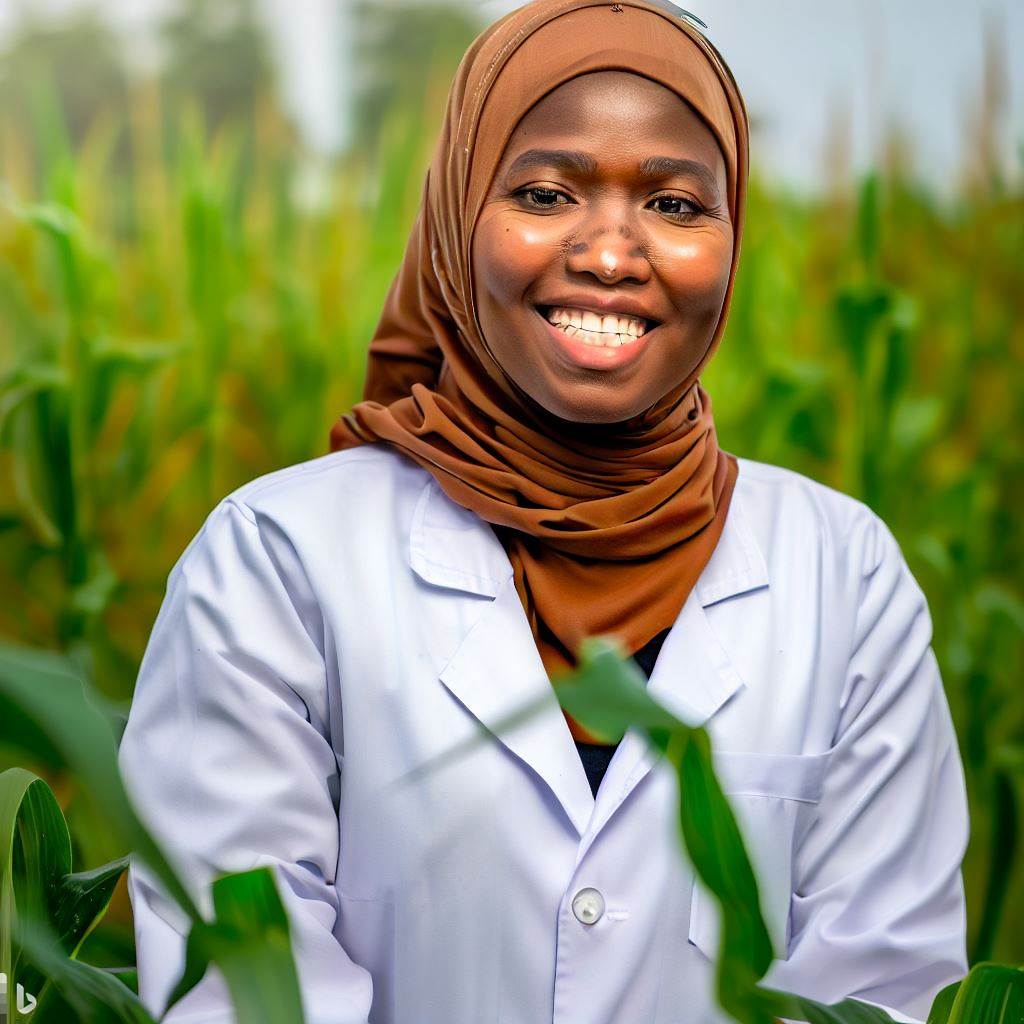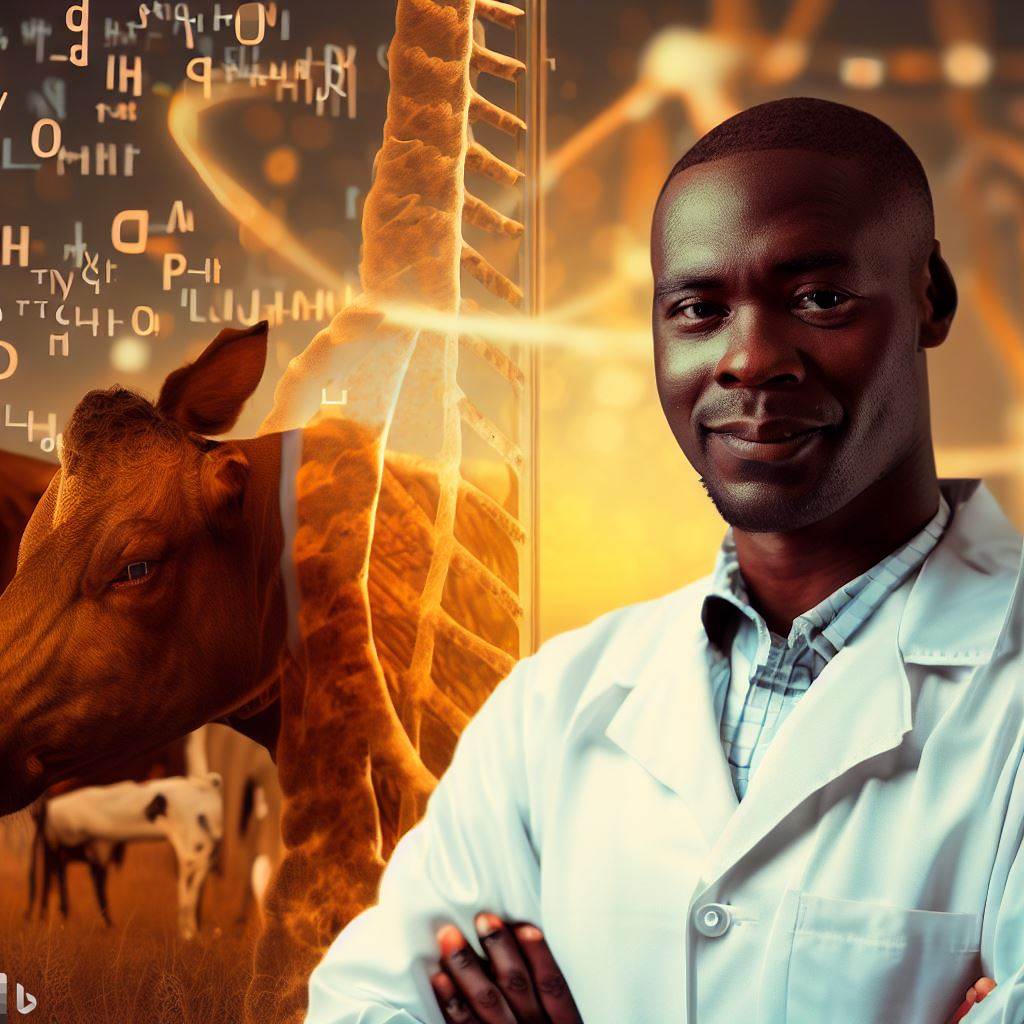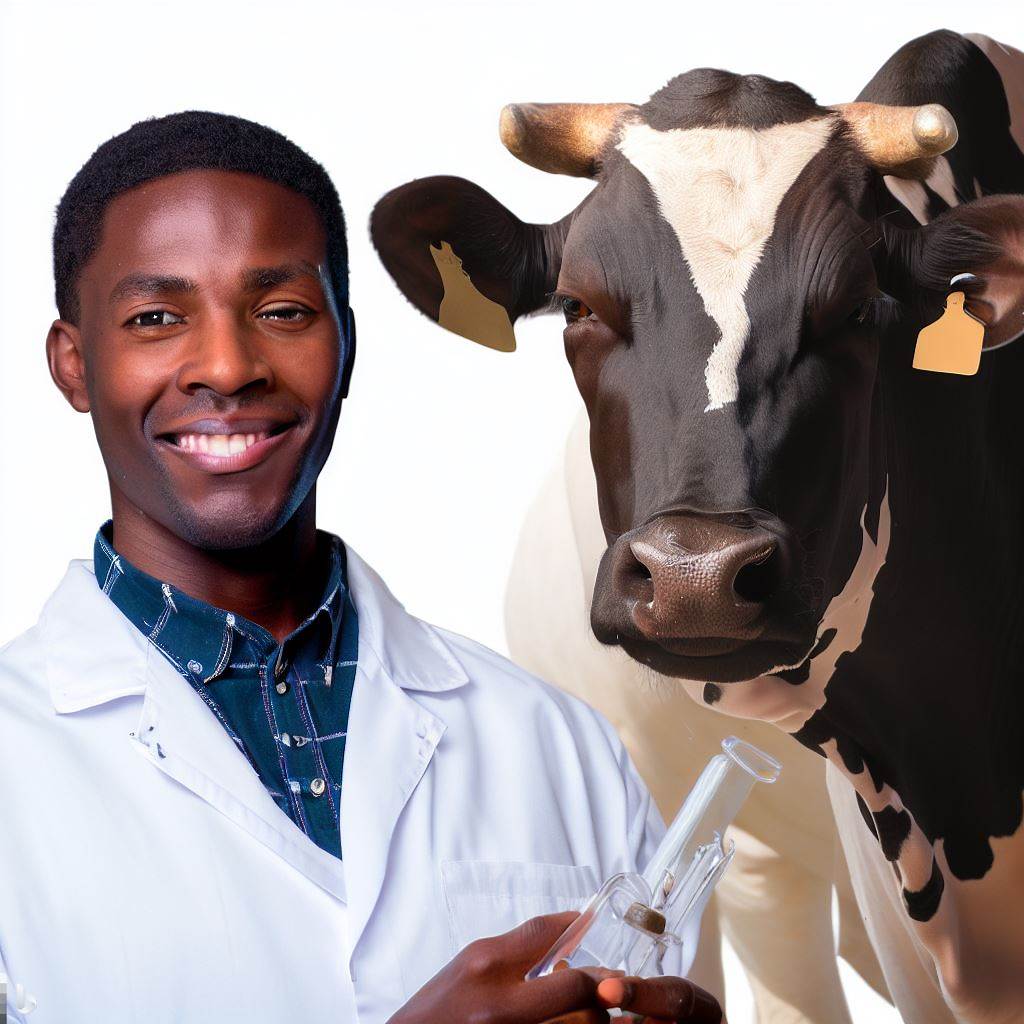Introduction
Animal geneticist play a crucial role in understanding and improving animal genetics and in Nigeria agro economy.
They are vital for Nigeria’s agro-economy due to their contributions to livestock breeding and productivity.
Animal geneticists are scientists who study and manipulate the genetic makeup of animals to improve certain traits and characteristics.
They play a significant role in understanding animal genetics and its impact on breeding and production. In Nigeria’s agro-economy, animal geneticists are of utmost importance.
They contribute to the development of superior livestock breeds that are more resistant to diseases, have higher productivity, and adapt well to local conditions.
This, in turn, enhances the overall agricultural productivity of the country.
By studying the genetic makeup of animals, animal geneticists can identify desirable traits such as increased milk production, disease resistance, and better meat quality.
They use advanced technologies and methods to selectively breed animals with these desired traits, resulting in improved livestock breeds.
Animal geneticists also play a crucial role in conserving and preserving endangered or indigenous animal breeds.
Their expertise helps in maintaining genetic diversity and promoting sustainable agriculture practices. Furthermore, the work of animal geneticists contributes to the overall economic development of Nigeria.
Improved livestock breeds lead to increased productivity, higher-quality products, and improved market competitiveness for Nigerian farmers and producers.
This, in turn, enhances the country’s agro-economy by generating more income, creating job opportunities, and supporting rural livelihoods.
In summary, animal geneticists have a significant impact on Nigeria’s agro-economy.
Their role in understanding and improving animal genetics contributes to the development of superior livestock breeds, increased productivity, sustainability, and overall economic growth in the agricultural sector.
Historical Background of Animal Geneticists in Nigeria
A. Brief overview of the development of animal genetics in Nigeria
Animal genetics in Nigeria has a long history, dating back to the 1950s. The establishment of research institutes and universities played a crucial role in the development of the field.
The initiation of breeding programs aimed at improving livestock productivity and quality contributed to growth.
B. Significant milestones and contributions of animal geneticists
Animal geneticists in Nigeria have made significant contributions to the development of indigenous livestock breeds.
Through selective breeding, geneticists have improved traits like disease resistance, reproduction, and growth rate.
The development of hybrids and crossbreeds has resulted in more productive and adaptable livestock varieties.
C. Evolution of the role of animal geneticists in Nigeria’s agro-economy
Initially, animal geneticists focused on improving local breed stocks through selective breeding and artificial insemination.
Over time, their role expanded to include genetic mapping, genomic selection, and gene editing techniques.
Animal geneticists now work closely with farmers, policymakers, and other stakeholders to address the challenges of a rapidly changing agro-economy.
They provide scientific expertise and advice on breeding strategies, conservation, and sustainable livestock production.
Animal geneticists also play a vital role in promoting the genetic diversity of livestock, ensuring their resilience to environmental changes and diseases.
The integration of modern technologies like DNA sequencing and molecular markers has revolutionized the field, enabling faster and more effective breeding programs.
Animal geneticists are actively engaged in research and development, with a focus on optimizing genetic resources to meet the increasing demands of a growing population.
Read: Inspiring Stories of Nigerian Animal Geneticists
Responsibilities of Animal Geneticists in Nigeria
A. Conducting research on animal genetics
- Animal geneticists in Nigeria study genetic variation and inheritance patterns.
- They identify desirable traits for breeding programs.
- Animal geneticists evaluate the impact of genetic factors on animal health and productivity.
B. Genetic improvement of livestock
- Animal geneticists implement breeding programs to enhance animal productivity.
- They select superior animals for breeding purposes.
- Animal geneticists utilize advanced techniques like artificial insemination and embryo transfer.
C. Ensuring sustainability and conservation
- Animal geneticists play a vital role in preserving endangered and indigenous animal breeds.
- They promote genetic diversity to enhance disease resistance in livestock.
- Animal geneticists safeguard genetic resources for future generations.
Read: Challenges Faced by Animal Geneticists in Nigeria

Contributions of Animal Geneticists to Nigeria’s Agro-economy
A. Enhancing animal productivity
- Producing high-yielding breeds for meat, milk, and eggs
- Improving feed efficiency and growth rates
- Increasing reproductive efficiency and fertility
- Enhancing overall profitability for farmers
B. Achieving food security
- Increasing the availability of animal protein for consumption
- Meeting the growing demand for livestock products
- Reducing import dependency on livestock products
C. Empowering small-scale farmers
- Providing technical assistance and capacity building
- Improving access to quality breeding stock and genetics
- Promoting sustainable and profitable livestock farming practices
Read: Exploring Animal Geneticist Salary Scale in Nigeria
Challenges and Future Prospects for Animal Geneticists in Nigeria
A. Lack of Adequate Funding and Infrastructure
- Inadequate funding hinders research and development in animal genetics.
- Lack of modern laboratories and equipment restricts scientific progress.
- Inadequate infrastructure prevents effective implementation of breeding programs.
- Insufficient funding and infrastructure limit the capacity of animal geneticists.
- Without proper resources, advancements in animal genetics cannot be achieved.
B. Limited Availability of Skilled Professionals in Animal Genetics
Shortage of qualified experts in animal genetics poses a significant challenge. Insufficient number of professionals hampers the growth of the sector.
Nigeria needs to invest in education and training to produce more skilled geneticists.
Attracting and retaining talent in the field is crucial for the future of animal genetics. Efforts should be made to encourage students to pursue careers in animal genetics.
C. Addressing Socio-cultural Factors that Influence Breeding Decisions
Socio-cultural norms can hinder adoption of scientifically driven breeding practices. Traditional beliefs and practices sometimes conflict with optimal breeding strategies.
Education and awareness programs are needed to address these socio-cultural barriers. Engaging local communities in dialogue can help overcome resistance to change.
Collaboration between animal geneticists and sociologists can provide valuable insights.
D. Collaborative Efforts and Partnerships to Overcome Challenges
Partnerships between animal geneticists, government, and industry are essential.
Collaborative efforts can lead to shared resources and expertise. Public-private partnerships can attract funding and accelerate progress in animal genetics.
International collaborations can provide access to advanced technologies and knowledge. Mutually beneficial partnerships enable the sharing of best practices and research findings.
E. Potential for Technological Advancements in Animal Breeding
New technologies like genomics and biotechnology offer immense potential in animal breeding.
Genomic selection can enhance breeding accuracy and efficiency. Bioinformatics tools can analyze complex genetic data for improved decision-making.
Application of assisted reproductive technologies can accelerate genetic progress. Investing in research and development of innovative tools can revolutionize animal genetics.
In general, animal geneticists in Nigeria face several challenges, such as a lack of funding and infrastructure, limited availability of skilled professionals, socio-cultural factors influencing breeding decisions, and the need for collaborative efforts.
However, the future prospects are promising with the potential for technological advancements in animal breeding.
By addressing these challenges and embracing new technologies, Nigeria can unlock the full potential of its agro-economy and improve the productivity and sustainability of its livestock sector.
Read: Job Outlook for Animal Geneticists in Nigeria
Discover More: Promoting Gender Equality in Nigeria’s Livestock Sector
Conclusion
Animal geneticists in Nigeria play a crucial role in improving animal breeds, increasing productivity, and ensuring food security.
It is essential to provide continuous support, resources, and recognition to animal geneticists in Nigeria to encourage their valuable work and further advancements in agro-economy.
With the growing awareness and focus on genetics in the agricultural sector, the future looks promising for animal genetics to drive Nigeria’s agro-economic development.




